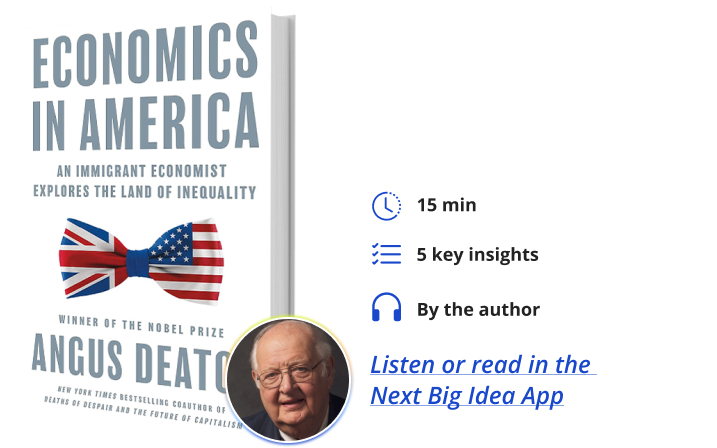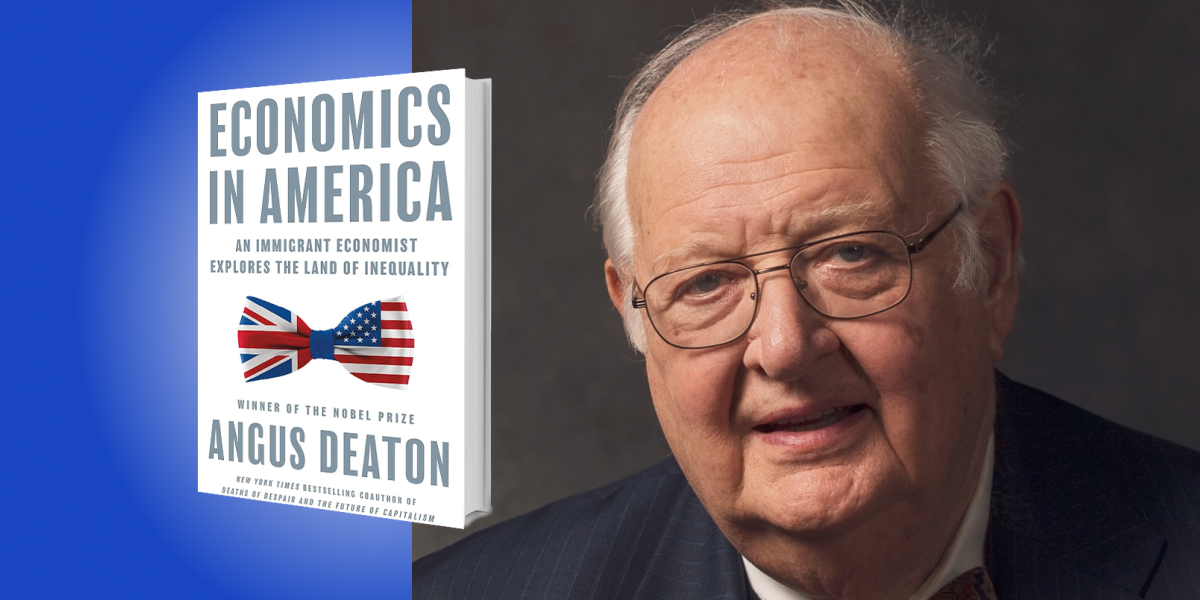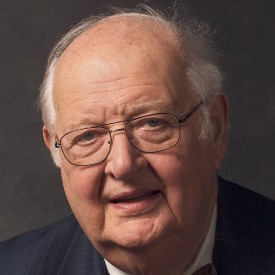Sir Angus Deaton is a Senior Scholar at the Woodrow Wilson School and also has a part-time appointment as Presidential Professor of Economics at the University of Southern California. He has taught at Cambridge University and at the University of Bristol. He is a member of the National Academy of Sciences, a Corresponding Fellow of the British Academy, and an Honorary Fellow of the Royal Society of Edinburgh. He is a fellow of the Econometric Society, and was the first recipient of the Society’s Frisch Medal for Applied Econometrics. He was President of the American Economic Association in 2009. Ph.D. Cambridge University.
Below, Angus Deaton shares five key insights from his new book, Economics in America: An Immigrant Economist Explores the Land of Inequality. Listen to the audio version—read by Angus himself—in the Next Big Idea App.

1. Why did I write a book that is part memoir, part stories, part economics, and part politics?
I wanted to tell the story of the last 40 years of economics in America, not by writing about economics directly, but by telling stories about economists and their adventures in research and in policy, including my own story. Economics is often boring or obscure, but many economists are not. Economics should be fun to read.
I was born in Scotland and moved from Britain to the United States in 1983, attracted by a higher salary and by the many great economists in America. My story includes the economists that I met along the way, their work, and how their work affected policy and politics. There are good stories, sometimes funny, sometimes not. There is much wrong with economics today, and America itself has become darker. While I am critical of some of contemporary economics, there is also affection. One non-economist surprised me by saying that my book is “a love letter to my profession.”
2. Disasters and triumphs: an immigrant Scottish economist in America.
Recounting my experience as an economist in the United States surfaced a wide-range of moments and memories. These memories include worrying about the NJ mob, and the time I “shot” a diner in a Burger King. On one occasion, I was screamed at by a busy cop from whom I’d asked directions, and on another occasion, in my confusion I mailed an important package in a trash bin. I felt lost when one of my new colleagues approvingly quoted Proudhon’s maxim that “government is theft,” though I understand a little better after living here for four decades.
“One economist argued that the Nobel prize was one of the three worst things in the 20th century.”
On the day I became a citizen, after 30 years in the country, I was asked if I had recently worked as a prostitute. I also recount how, in the wild west of American healthcare, I, who did not know the difference between a pediatrician and a podiatrist, struggled to find a good surgeon to replace my hip. I also explored what it was like to go to Stockholm to receive a Nobel Prize, and what the Nobel’s have done to economics, often bringing happiness, but also jealousy, and even rewriting the history of ideas. One economist argued that the Nobel prize was one of the three worst things in the 20th century, along with the population explosion and the “infernal” combustion engine—and he was one of the winners!
3. Economics at its best: uncovering exploitation.
In the 1980s, my (then) young Princeton colleagues, David Card and Alan Krueger, looked at the evidence to see whether modest increases in the minimum wage would cost some workers their jobs. They found no evidence of job loss, contrary to what almost all economists thought. At the time of their discovery, they were abused and insulted by economists on the right, as well as lobbyists from the fast-food industry. They were accused of abandoning science and told that “water doesn’t flow uphill” that their work was like “cold fusion.” They were also accused by a Nobel Laureate of being “camp-following whores.” But eventually, the theory caught up with the evidence.
Exploitation of workers, it turns out, was not just a theoretical curiosity, but a real occurrence that is likely becoming increasingly important. When employers are making money out of their employees by keeping their wages low, higher wages don’t cost jobs, but they do reduce employers’ profits. The work, and its subsequent history, is a great example of evidence and theory coming together, not at once but over time. It also brought back older ideas of inequality being about class, as in the conflict between capital and labor. David Card was awarded the Nobel Prize in 2021 for the work; Alan Krueger was not eligible because he had committed suicide in 2019.
4. Economic research is often controversial.
The controversy surrounding economics is both good and bad. It’s good because it shows that people care about what we are doing. And it’s bad because the politics can undermine the science. If no one ever paid attention, we would not be doing our jobs. Because people have different values, and different interests, a new finding, or even just new data, will often be unwelcome to some, and there will be challenge and debate.
“The best and most valuable economists are those who can change their minds with the evidence.”
The “politics of numbers” are the triumphs or anger that meet new economic evidence, especially on hot-button topics like poverty, unemployment, inflation, or economic growth. It is bad when politics swamps the science or corrupts the evidence. When this happens, progress is replaced by half-truths, lies and by name-calling. And it is not only the politicians, but sometimes the profession itself. It is distressing when so many “findings” are predictable by the political leanings of the economists who find them. The best and most valuable economists are those who can change their minds with the evidence.
Even so, topics like the measurement of poverty have become so politicized and so polarized that we may have lost the ability to say anything that is both useful and truthful. In this, economics is like other areas of science of policy importance—like public health—where polarization has become an increasing threat.
5. Economists sometimes go wrong.
Economics has long focused on the idea of efficiency, too much so in my view. Many economists subscribe to Lionel Robbins’s definition of economics as the allocation of scarce resources among competing ends. According to this, the main object of economics is to make sure the allocation is done well and that incomes are as large as possible. Markets are good at promoting efficiency. They do not need any centralized assistance, and they generate prices to guide allocation. The price system is certainly one of the great wonders of the world. Prices allocate things to the people who want them the most, in the sense of being willing to pay the most for them.
Beyond that, there was an influential libertarian school—Milton Friedman its most famous practitioner—that argued that markets were an essential component of freedom, that any attempt to interfere with markets, no matter how well meaning, could only make things worse. Governments are always the problem, and never the solution.
Today, most but not all economists regard these views as extreme, though there are many politicians who make their bread and butter by endorsing these ideas. Even so, the economics profession accepted too much of the libertarian creed. This has had some very bad consequences, such as trusting financial markets to police themselves before the Financial Crisis, encouraging free movement of capital across national borders, or accepting—and in many cases celebrating—an all-volunteer military. Other approaches to economics, that we should think about things that people care about other than money, or that we need to go beyond individualism, were downplayed and neglected. I include myself among those who got a little too carried away. Mea culpa.
To listen to the audio version read by author Angus Deaton, download the Next Big Idea App today:































